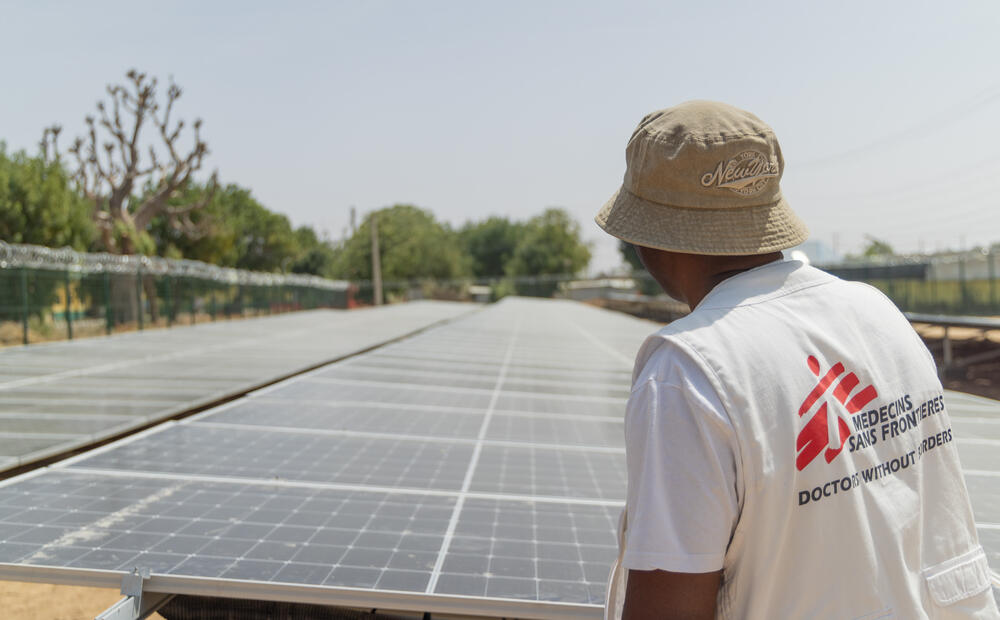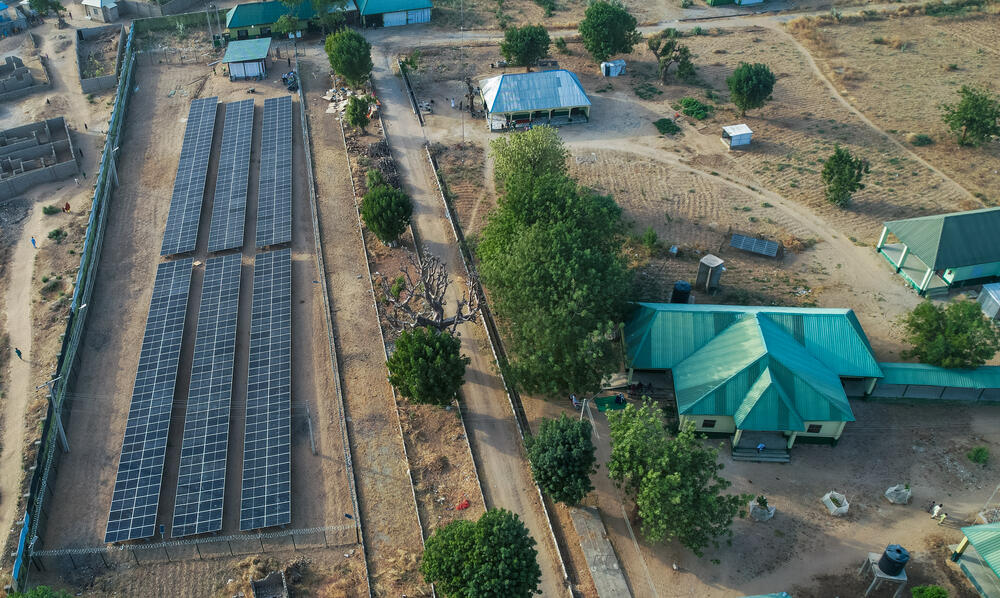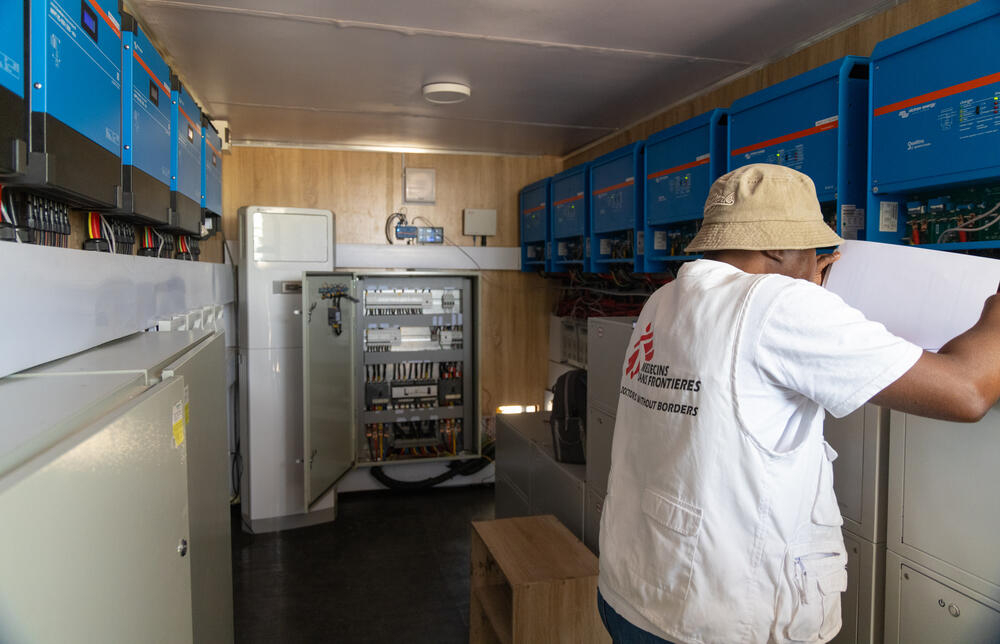Harnessing solar power in Nigeria
Médecins Sans Frontières / Doctors Without Borders (MSF) teams in northern Nigeria are embracing solar energy to power the hospitals they support, which have historically depended on expensive fuel-intensive generators.
By moving to renewable energy, communities in the region now have better, more sustainable access to life-saving medical devices, medication, and infrastructure.
Moments before the switch, many staff at Zurmi Hospital held their breath, worried about how the change in power would affect medical operations.
“We have people on oxygen tanks,” an MSF staff member said, reminding the engineers what was at stake.
Very quickly, those fears turned to relief, as the transition went smoothly – and the power remained stable throughout the day and into the following days.
“Before, it was extremely challenging,” said Israel Mushore, the energy manager who worked on the project for five months.
“Patients would be taken into surgery, and there was always the risk of a power cut in the middle of the procedure. Now, with solar power, we have a stable and reliable energy source.”
For years, Zurmi General Hospital had been cut off from the national grid. Instead, it had to rely on generators that consumed more than 3,000 gallons of fuel each month to power the medical facilities. The system led to frequent and frustrating power disruptions.

Help us prepare for the next emergency
Since installing 436 solar panels this year, the 250-kilowatt solar power system has consistently kept medical devices running, medications refrigerated and enabled emergency surgical procedures.
A battery backup system also ensures that hospital operations continue smoothly at night and during extended periods of cloud coverage. Patients in the hospital, including in maternity care, the neonatal intensive care unit, and the cholera unit, have experienced their healthcare improved.
“I cannot overstate how the switch to solar panels has improved our ability to respond to malnutrition and paediatric emergencies by being able to better store vaccines and expand our outreach,” said Abdullahi Mohamed Ali, Head of MSF in Nigeria.
At the same time, the introduction of renewable energy has strengthened the hospital’s ability to provide consistent, quality care over the long term. By changing the infrastructure of what needs to be sourced, transported, stored, and paid for, the hospital is now better equipped to deliver more reliable and uninterrupted care.
And, because it is a cleaner energy source, it has a smaller environmental footprint, reducing its contribution to the climate crisis that is already impacting the people MSF serves.
Climate change affects patients’ health
Climate-related shocks, such as droughts and floods, are severely impacting agricultural productivity, disrupting access to land for livestock herders and farmers, and sparking competition over resources. This is fuelling violence and displacement, leading to food insecurity and malnutrition across the region.
Over the years, MSF teams in the eight northern states of Nigeria where MSF operates – including Zamfara State, where Zurmi Hospital is located – have recorded a concerning rise in the number of severely malnourished children with life-threatening complications.
In 2024, MSF treated over 300,000 children—an alarming 25 percent increase from 2023. Over 75,000 of these children required inpatient care. This year, in anticipation of an even higher number of patients suffering from malnutrition, MSF is in the process of increasing its bed capacity in some of its hospitals.
“Every day, we witness how climate factors influence the health of communities around the world”
MSF teams have also observed how years of changing weather – including warmer temperatures and shifting rainfall – have enabled mosquitoes to breed more rapidly and thrive in new areas, increasing Nigerians’ exposure to malaria.
According to 2023 data from the World Health Organization, Nigeria accounted for 26 percent of the global 263 million cases of malaria, with a significant surge of an estimated 6.8 million more cases from 2018 to 2023.
“Every day, we witness how climate factors influence the health of communities around the world,” Mohamed Ali said.
“From the rising frequency of extreme weather events to violent land disputes stemming from drought-ravaged farmlands that have diminished crop yields, the connection between climate and health is stark.”
Doing more to mitigate climate change
In addition to the consistency of using solar energy, transitioning to renewable energy has meant that MSF can better respond to patients’ needs.
By spending less money and time to source and transport costly fuel to keep generators going – especially in remote areas – MSF has been able to devote more resources toward other necessary costs to keep its hospitals running and accessible to patients.
Already, the organisation is starting to see this through its other solar panel installations in Zamfara State – Talata Mafara and Gummi – and in the states of Borno, Jigawa, Katsina, Bauchi, Kano, and Sokoto.
“While there are still other steps to be taken to reduce MSF's overall environmental impact, switching to solar power is part of our work to create a more sustainable solution that will benefit patients and the communities,” Mohamed Ali added.
MSF in Nigeria
With over 190 million people, Nigeria is the most populous country in Africa and the seventh most populous country in the world.
Nigeria also has one of the fastest-growing economies, which is based primarily on the petroleum industry. However, a decade-long conflict has devastated the northeast of the country. Thousands have been killed and nearly two million people have been uprooted since fighting broke out between the military and non-state armed groups.
Médecins Sans Frontières/Doctors Without Borders (MSF) has been responding to disease outbreaks and emergency health needs in Nigeria for many years, focusing on maternal and paediatric healthcare throughout the country.


